Start Demagoguing Against the Old
It's better to adopt political narratives that get closer to the truth
A Democratic organization called Deciding to Win just put out a report on the popularity of dozens of policy positions. Their charts look like this.
There’s not much surprising here for anyone who has looked at polling data before. People love Social Security and Medicare, dislike immigration, and want tough on crime policies. They are skeptical of government creating new programs (free universal childcare, free public college), but like ideas that raise costs and burdens on employers in favor of workers (increase minimum wage, protect the right to strike).
One thing the chart captures is just how much people support giveaways to old people over other forms of welfare. Below is a figure that simply extracts policies that are aimed either at helping the old or helping families with young children.
When studying public opinion, it’s shocking how much Americans love Social Security and Medicare. They’re not overwhelmingly in favor of all government programs that give people money or services. Rather, it is these two in particular that seem special.
Looking within the category of policies meant to help families with children, we see a major inclination towards a status quo bias. More funding for Head Start (+14) and making school lunches universal (+14) are both popular, while free child care and a $3,000 bonus to all families are not. The best explanation here seems to be that Head Start and school lunches already exist, while the other policies don’t, so spending more money on what we’re doing strikes people as better than starting a new kind of entitlement. Yet increasing Social Security payments and Medicare coverage poll better than anything involving helping families with children.
Is there something else going on here? Maybe people consider Social Security and Medicare to be things you pay for already, so there’s some illusion where you don’t lose any extra money by funding them further. This of course is stupid, but maybe people do in fact think this way. Hypothetically, if there was a universal child care program that people paid into, maybe the public would support increasing funding for it as much as they do for Social Security and Medicare. Yet Medicare for kids is -4, compared to expanding Medicare to cover dental, vision, and hearing at +31, and increasing Social Security payments to low-income seniors is at +24. Is there some kind of psychological trick here where expanding Medicare to do more things for old people is in essence what the program is for, while expanding it to kids covers something new? The public must realize that it all comes out of taxes in the end, right?
I’m not sure what to do with the opposition to lowering the Medicare age to 60 (-6). Maybe 60 year-olds are too young to be sympathetic? Do you have to be the exact age of 65 to deserve nonstop benefits showered on you until the end of your life?
The Occam’s Razor explanation is that the public thinks that the most legitimate use of government funds is giving it to the elderly, and they have an idea of an elderly person as someone at least 65-years-old due to bureaucratic convention. We can check the Deciding to Win report against other polls. Recently, YouGov did a survey where they asked Americans about various forms of government spending and gave them five choices on what they want to do about each one: increase a lot, increase slightly, keep the same, decrease slightly, and decrease a lot. They could also choose “not sure.” Here’s the percentage who wanted to cut spending versus increase spending across categories.
The only thing more popular than Social Security and Medicare is Veterans. Only 4% of Americans want to decrease spending on Social Security, and 6% for Medicare. Overall, 76% of the public believes the federal government spends too much, compared to 8% who say it spends too little. Yet the only area where more people want to cut rather than increase spending is foreign aid, a tiny fraction of the budget.
And now you see why you should have contempt for the political views of most people. It doesn’t mean most people are bad, but only that you should not expect them to have sensible political opinions any more than you would expect them to understand some highly specialized scientific field. And I don’t mean sensible political views in the sense that they need to agree with me. Rather, their opinions are self-contradictory on their own terms. The American people want less spending, more spending on the main things government actually does, lower taxes on everyone but the very wealthy, and balanced budgets, all at the same time. They also want degrowth policies like less trade and immigration, cutting off paths to grow our way out of financial problems. They seem to think that hating foreigners is a magic elixir that fixes all problems, and that part I would consider to be a moral failing rather than a matter of simple stupidity. But we can debate whether the public is stupid and good or stupid and bad, but the one thing that seems indisputable is that it’s very stupid. I distrust any thinker who doesn’t begin with a deep contempt for public opinion, though you must seriously grapple with its power.
Explaining Tradeoffs
A new NBER paper finds that “There has been a seismic shift in age-wealth profiles in the U.S. over years 1983 to 2022. The most notable is the sharp rise in the relative household wealth of age group 75 and over. Correspondingly, the relative wealth holdings of all other age groups dropped over these years.” Cremieux put a nice chart together showing the growing divergence between older and younger households.
It’s strange that so much of the federal budget goes to Social Security and Medicare, which benefit the wealthiest age demographic in the country. And these programs are eventually going to lead to a massive decrease in living standards if they don’t get under control. Eventually, we’ll have to either raise taxes or cut benefits, and my preference is to cut benefits because I want to live in a free, dynamic, wealthy country rather than one where the energies of the young and productive are sucked dry to continually make life more and more comfortable for those on death’s door.
To me, there’s nobody less deserving of being the beneficiaries of the welfare state than the old. If someone grows up poor, on his eighteenth birthday you wouldn’t be inclined to blame him that much for his poverty. The older he gets, the longer he has had to work hard, acquire skills, save money, benefit from compound interest and the appreciation of assets, and even have children that may provide for him. Poverty becomes more blameworthy with age. And most people do avoid poverty when they’re older – I see no reason to bankrupt the country for the sake of those who don’t. Whether you take the perspective of helping people according to need or separating the deserving from the undeserving poor, in either case giveaways to the elderly are one of the worst things you could be spending money on.
The common explanation of why pensions are straining finances in Western countries is that old people vote at high rates. But these programs have massive support across the entire public. If only 4% of Americans want to cut spending on Social Security, that can’t all be because of old people. That said, there is an age gap. The General Social Survey shows that Americans age 18-34 are less likely to say we spend too little on Social Security compared to other groups. Interestingly, this has only been true since 2014. Before that, the elderly were actually least in favor of spending increases.
One reason to be optimistic is that there’s evidence to suggest that when you start being honest with people and give them options, they can become less absolutist in their support for entitlement spending, especially among the young. When George W. Bush made a push to reform Social Security in 2005, he promised not to touch the program for those already receiving benefits, only suggesting allowing those under 55 to invest a portion of their Social Security taxes into personal investment accounts that had to be conservatively managed. One Quinnipiac poll from the time asked people about a variation of that plan. The idea had +24 support among those 18-40, compared to being -21 among those over 60. Boomers, who were 41-59 years old at the time, approved of the idea by 4%. Here are the results of a different survey showing a similar age gap, but with lower support across the board, likely due to question wording.
Thus, a silver lining in this dark story is that if you explain to people the coming financial crisis, support for cutting benefits increases, with a massive age gap.
Two decades after Bush failed in his efforts, it’s still young people who are more open to reforming Social Security and Medicare, with the elderly more opposed.
The Cato Institute did a poll that told respondents that by 2033, we will have to either cut Social Security benefits, increase taxes, or borrow more money to continue the program as is. When individuals are forced to choose one of those options, here is what we get.
Much better! We went from 4% wanting to cut Social Security benefits to 28% just by explaining that there is a tradeoff. Reducing benefits is only 7% behind increasing taxes.
And now you also get an absolutely massive age gap.
Gen Z supports reducing benefits over raising taxes by 29 percentage points, while Baby Boomers prefer raising taxes by 39. The people who just want to borrow the money are morons because you’re just going to face the exact same choice again before long, so we can set those responses aside, since if we listen to the borrow more crowd we’ll eventually turn into Argentina. Most polls tell a pessimistic story about the potential for cutting entitlements. But here’s an optimistic finding showing that by explaining to voters the facts you can get young people to favor reducing benefits over raising taxes by a ratio of 2.5:1.
The Elderly Are the Problem
I’m not going to say that entitlement reform is ever going to be easy or that there’s one trick you can use to get the public to adopt Paul Ryan’s views on the issue. Part of the answer I think is to tell people the truth, but politicians who tell the truth are disadvantaged. This is why around 2010 the Republican Party was led by people like Ryan, who talked honestly about what was happening, and it’s now led by people like Trump and Vance, who lie to their supporters by telling them there aren’t any tradeoffs involved.
Rand Paul recently started discussing the need to raise the retirement age, and his replies were full of conservatives saying that all you have to do is prevent immigrants from receiving benefits. Republicans will blame foreigners for the coming entitlements crisis, Democrats will blame the wealthy. The Democrats’ view will have a grain of truth to it, as you can just tax your way out of the problem while you can’t just remove enough foreigners to make these programs solvent. But that solution would just take us to European levels of taxation or beyond, with practically all of the extra spending going to the elderly instead of services that benefit the entire population.
There appears to be something deep in human nature here. It sure seems more natural to blame outsiders or the wealthy for a nation’s problems than old people. Maybe because in our prehistoric past, old people just died when they became a burden, while foreigners and those who hoarded resources were actually more to blame for problems that communities faced. That’s why across the world, it’s normal to see the right-left axis largely characterized by whether people dislike foreigners or dislike the wealthy and corporations more.
That said, anti-elderly politics is far from unheard of in modern times. The Port Huron Statement published by the Students for a Democratic Society in 1962 begins with an introduction titled “Agenda for a Generation.” It denounced the way that the lives of students were controlled by university administrators and romanticized young people as a force for change. Today, climate change activism has inspired an idealistic youth movement that blames earlier generations for a coming crisis. Communists in totalitarian countries and left-wing movements in more developed societies have perfected the idea of demagoguery based on age, with the Cultural Revolution being an extreme example of this. We definitely shouldn’t go as far as Mao; I’m only using him as an example to show that it is not impossible to create a mass movement based on the young being resentful towards the old.
Note that you don’t see movements inspiring people going in the other direction. Post-Great Society conservatism, up to and including anti-woke activism, has often criticized young people for being overly sensitive, morally decadent, and dangerously idealistic. Yet such positions lack energy. When we talk about generational issues, those on the side of the youth against the old tend to have the moral high ground, in the same way that in discussions of gender issues, defending women has the high ground over defending men, and in racial discussions, being on the side of nonwhites brings greater moral legitimacy than standing with the dominant majority.
One benefit of anti-elderly demagoguery over anti-foreigner and anti-rich demagoguery is that it’s based in truth. In the United States, the main economic problem facing young people is the unaffordability of housing, and the main economic issue facing the future of the country is the coming entitlements crisis. Both these issues involve old people making the lives of younger and future generations more difficult as they pursue their narrow self-interests. Anti-foreigner and anti-rich demagoguery aren’t even directionally correct; you should be thankful for immigrants, international trade, and the existence of the most productive members of society. The fact that new form of demagoguery I advocate for is based in truth can help attract higher quality thinkers and activists to the anti-gerontocratic cause, giving it an advantage. I’ve previously put forth Critical Age Theory as a framework to connect a wide range of economic and social problems under a larger narrative.
Of course, old people aren’t exclusively the ones to blame for what has gone wrong. As we’ve already seen, entitlement spending is popular across every demographic. But once you make the issues involved salient – as happened both in the Cato survey and out in real life during the debate over Bush’s reforms – young people do seem to come down more on the side of fiscal responsibility. This is without anyone actually running on an anti-gerontocratic platform. When differences in interests and views based on age become more politically relevant, I think we’ll see more old people want to be on the side of the young than vice versa. People already seem to believe that there is a crisis, with 79% of Americans saying they doubt they’ll get their full benefits. This is a strong foundation to build on, as you can frame the issue as one involving tradeoffs between selfish old people and future generations who would still like a shot at the American dream.
Public opinion is mostly terrible, but that can’t be an excuse to let the country decline. Trying to have a well-functioning, free society means engaging in a constant struggle to change, subvert, or work around it. If successful democratic movements usually need to be demagogic, then let’s pick the forms of demagoguery that get us closest to the truth. To say old people are destroying America is of course an oversimplification. But it’s one that has more potential to inspire people to fight for positive change than almost any other narrative.

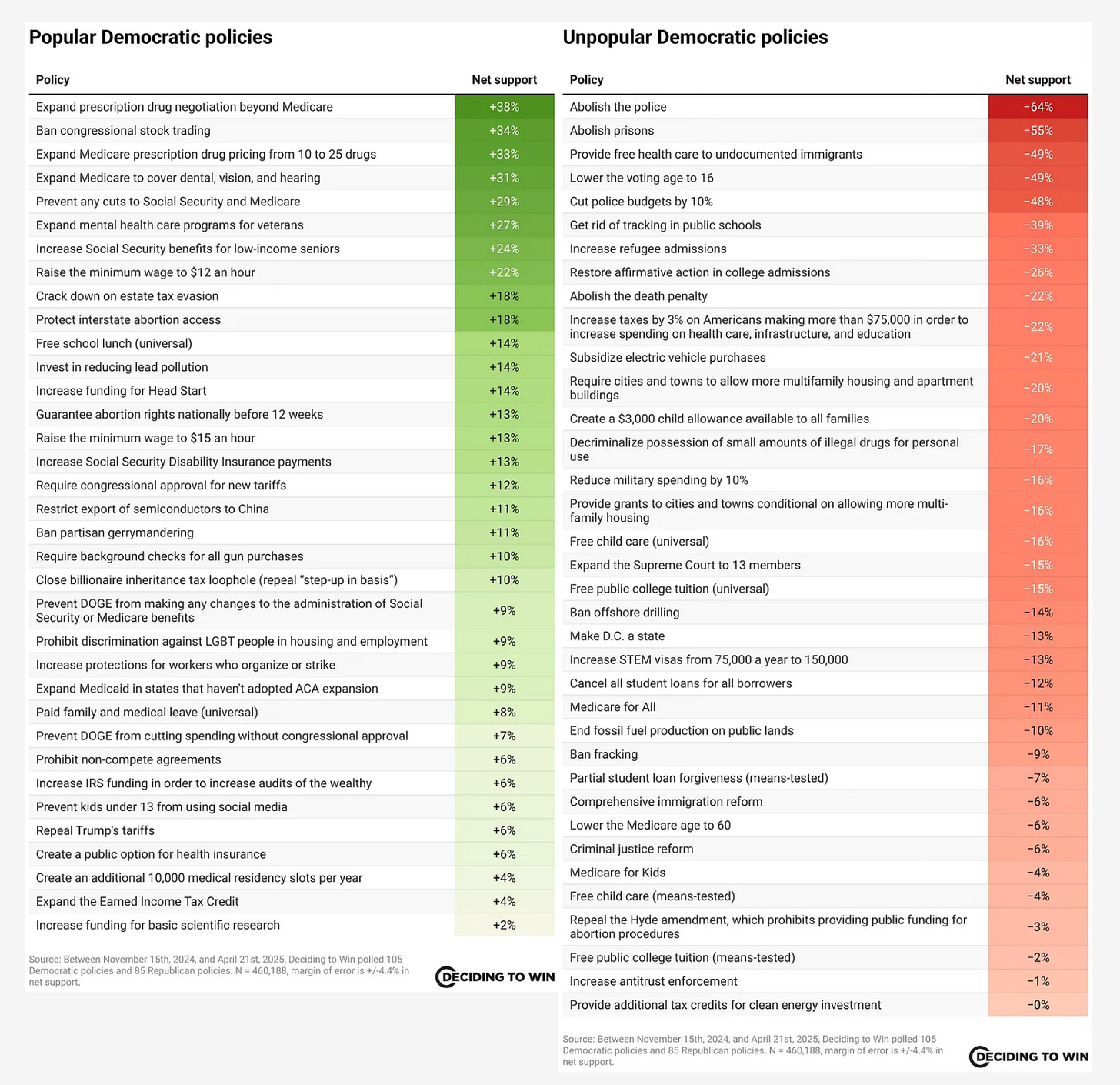
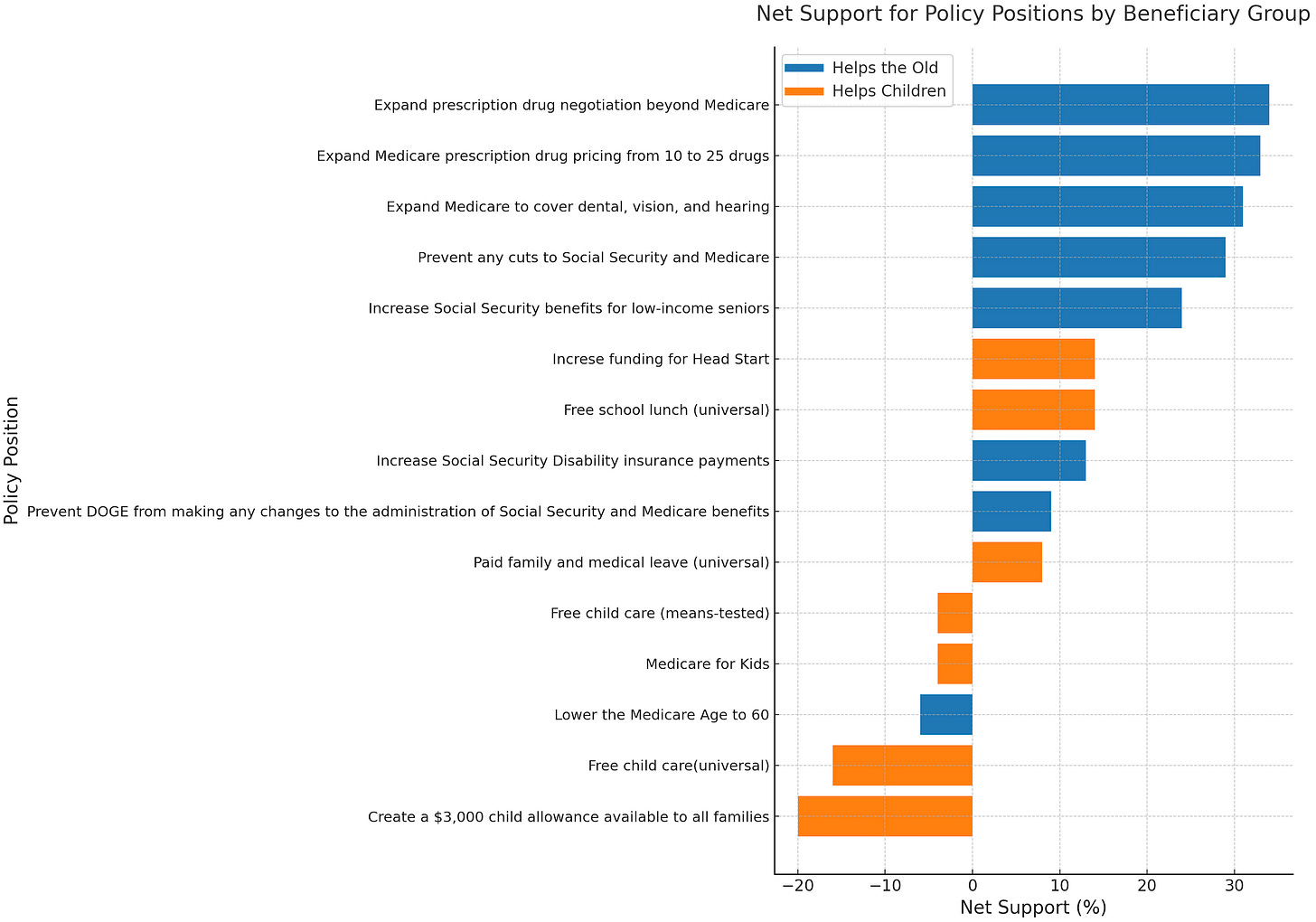
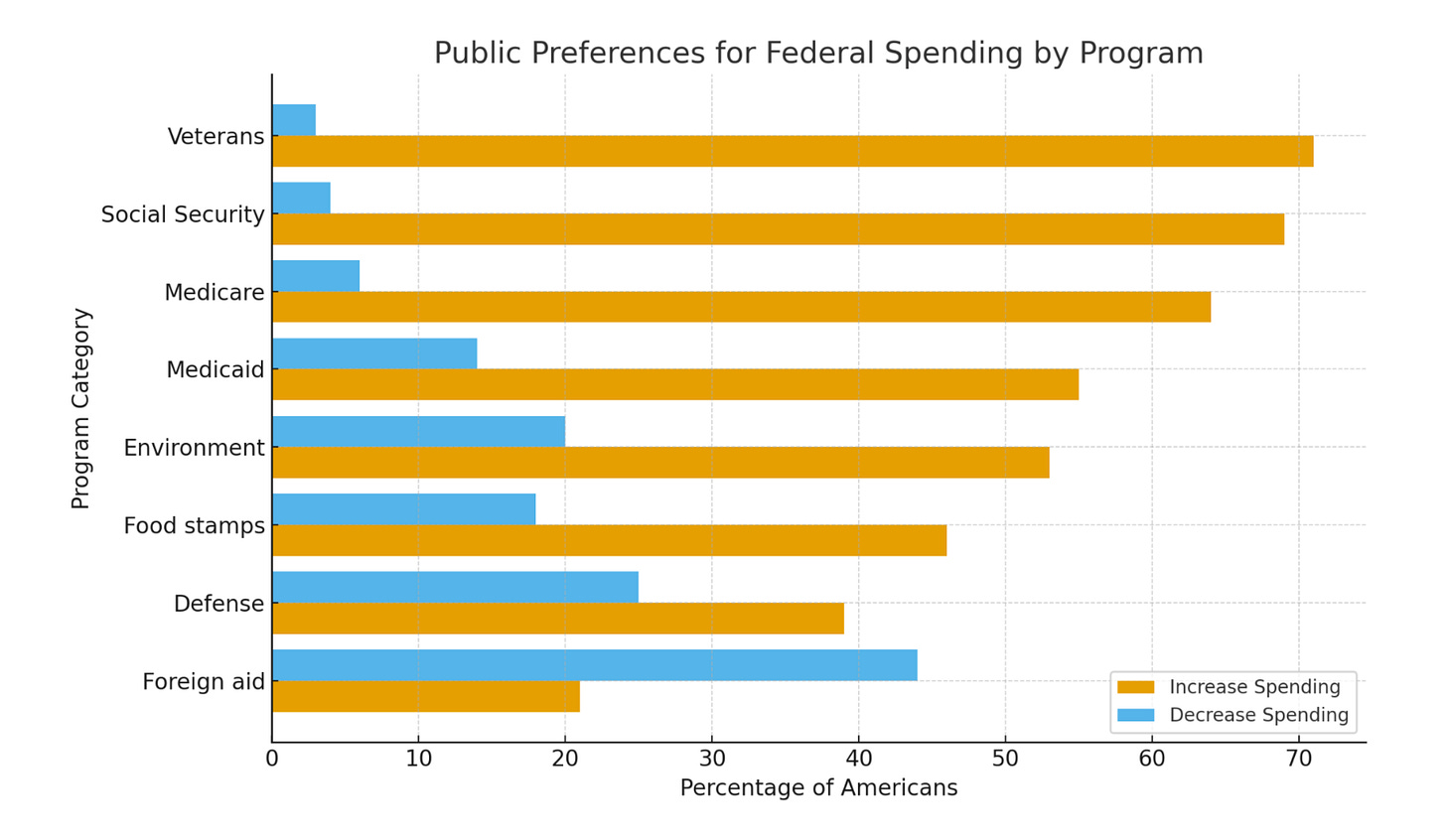
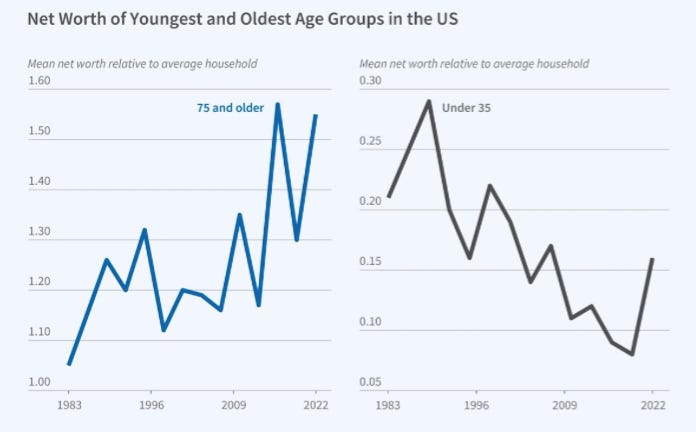
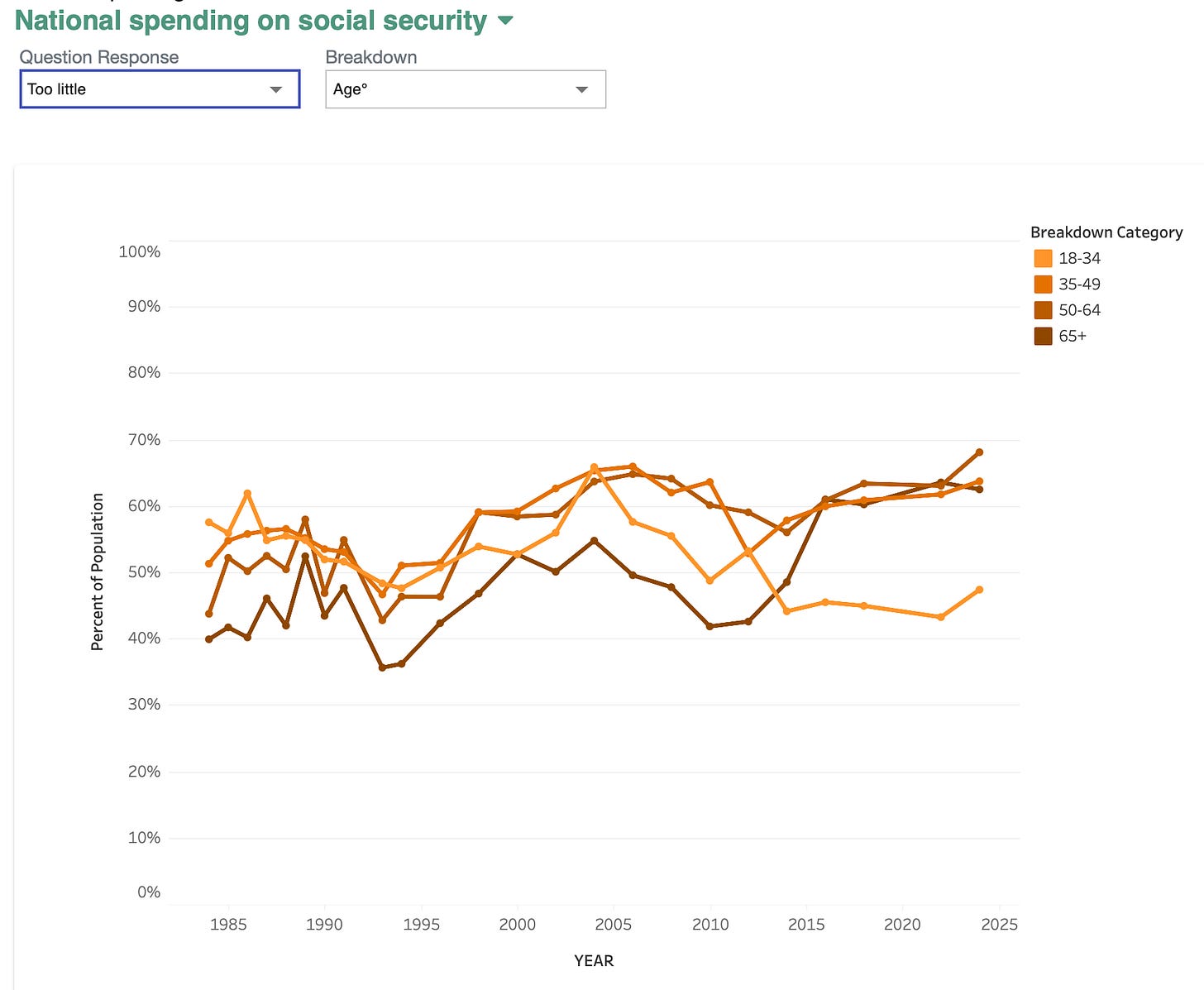
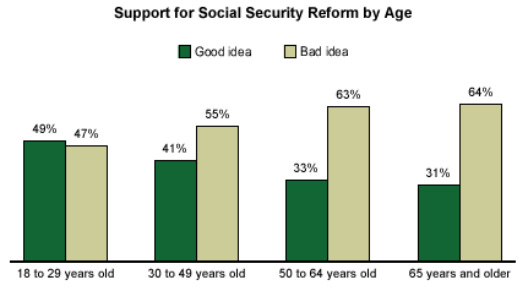
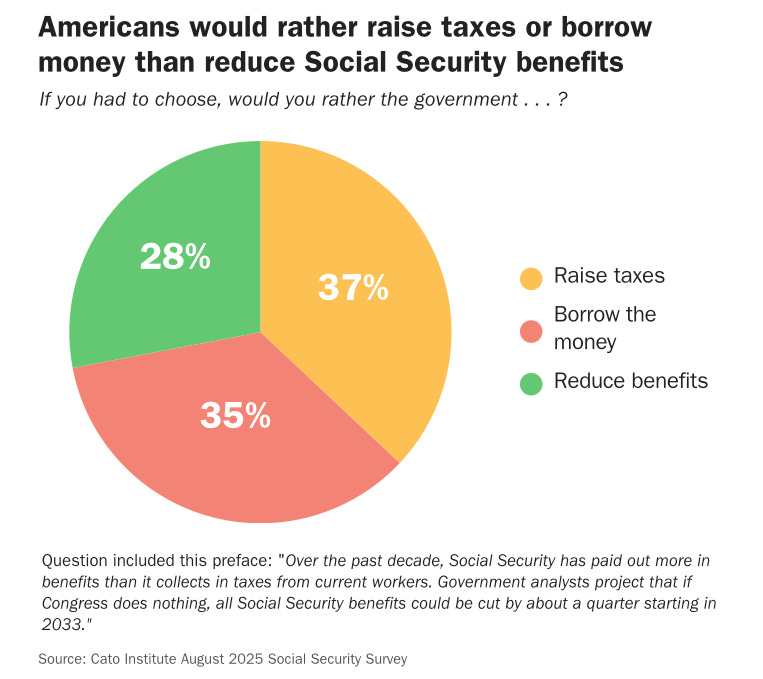
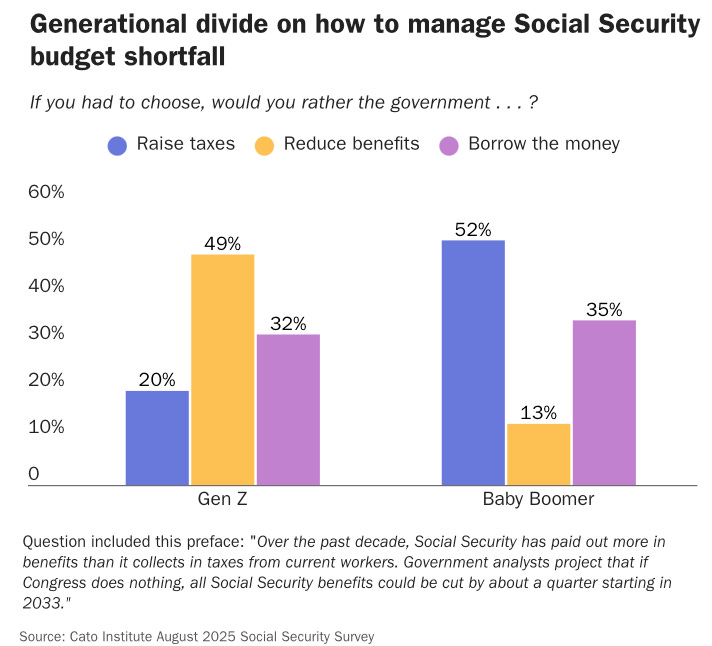
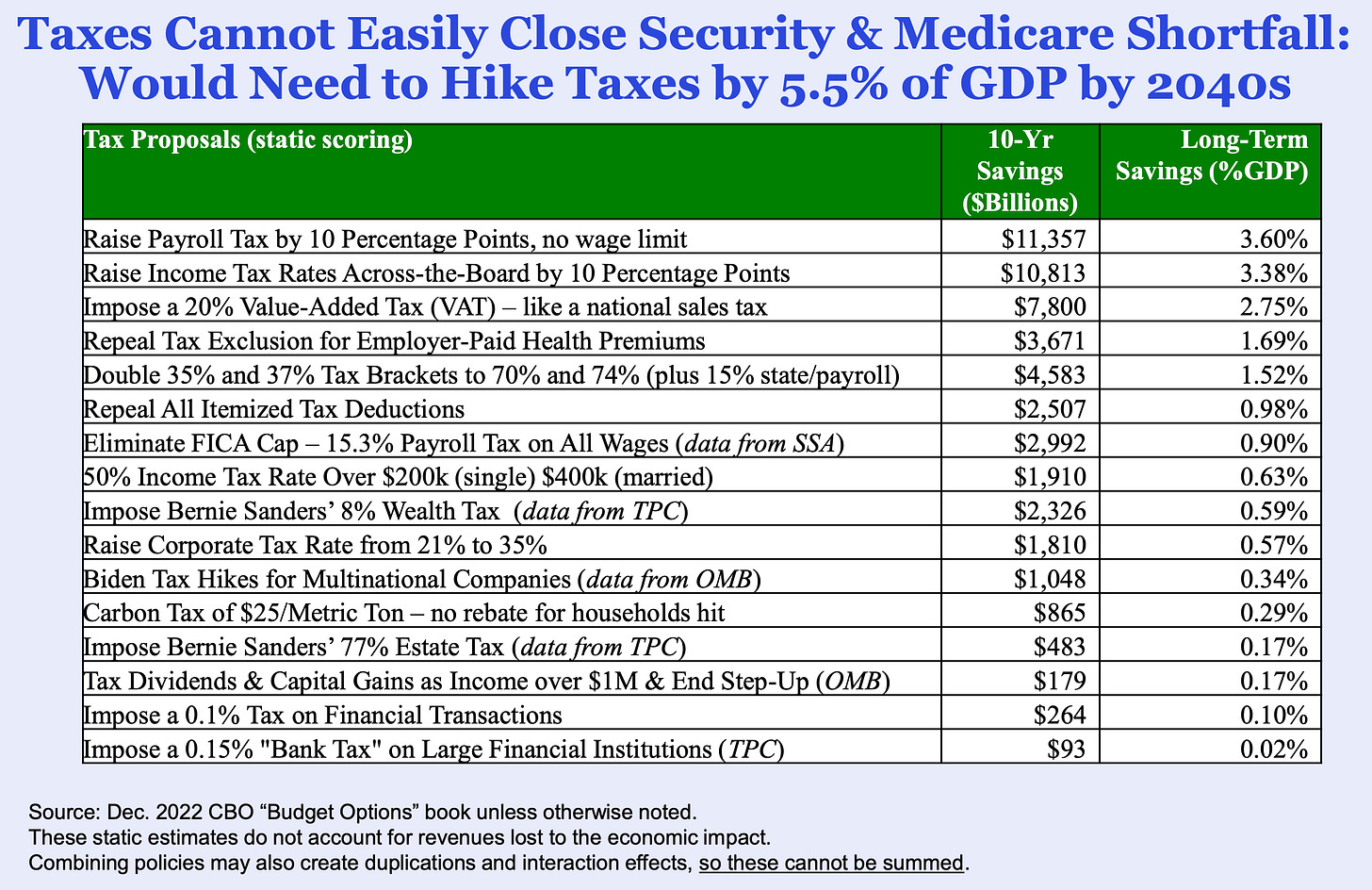
I like the general thrust of this article but i think it misses an important element: everyone gets old and most people have parents and grandparents. so if you do old people austerity, who ends up taking care of them? Yea the young people. And taking care of old people is a huge time and financial drain. Many people want to shunt mom and dad into a home, have the government pay, and not have to deal with that.
and lots of people don’t have kids and even if they do don’t want to rely on them. So being for old age entitlements is more rational for the young than it might look like at first glance.
I would focus on Medicare more than Social Security. Social Security has only just barely higher than a 1:1 payout ratio to average liifetime taxes paid ratio. So seniors can reasonably claim that they "paid for" their Social Security benefits. Medicare, on the other hand, is out of control with a greater than 3:1 ratio.
It is totally unfair that cash-strapped young and healthy adults have to pay exorbitant private insurance and provider rates while Boomers in six bedroom McMansions get Medicare. Medicare should be dissolved entirely. Seniors should be moved onto the private insurance market like everyone else. If they are genuinely poor (based on assets, not solely based on income) then give them a subsidy. But if they have a $2 million house, stock portfolio, or large pension then they should have to pay full freight. They can liquidate their large house (which is good for the economy by freeing up large homes for the families with several children who really need them) and downsize to a townhouse and pay for their health care with the proceeds of the sale.